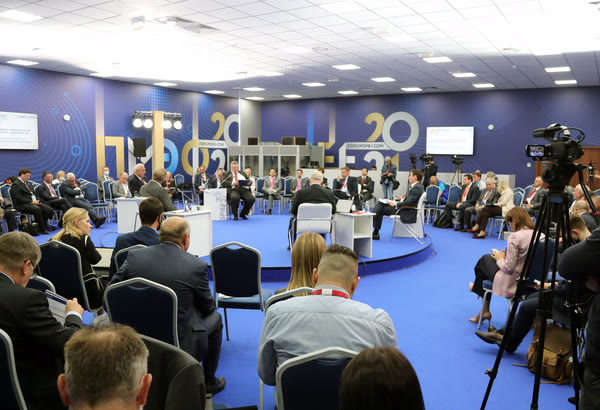
The Greater Eurasian Partnership in an Era of Technological Transformation
KEY CONCLUSIONS
COVID-19 has significantly expanded integration in the Eurasian partnership, which is essential to moving away from hydrocarbon fuels
“The pandemic actually played a very interesting role in terms of integration in the Eurasian space. […] My personal opinion is as follows: there is a saying that misfortune brings people together. And this misfortune that befell us all caused us to very quickly, literally in March and April, start making decisions – systemic decisions that aim to protect markets and aim to protect our countries and consumers. [...] All this suggests that today the EAEU is actually increasingly aware of itself as a single integrated whole,” Deputy Prime Minister of the Russian Federation Alexey Overchuk said.
“You all know that the topic of the Greater Eurasian Partnership is constantly on the agenda of high-level meetings, and there is political will,” Eurasian Economic Commission Chairman of the Board Mikhail Myasnikovich said.
“What is the essence of the possible reaction, including in the Eurasian space and in EurAsEC? What can be done and how should it be done? The crux of the matter is that mankind has made a decision. Mankind has decided to give up hydrocarbons. This is a revolution on a scale comparable with the English Industrial Revolution. [...] Even the industrialization that took place in our country in the middle of the 20th century seems smaller in scale to me than the rejection of hydrocarbons,” said Anatoly Chubais, Special Representative of the President of the Russian Federation for Relations with International Organizations to Achieve Sustainable Development Goals.
“Discussions about manmade or some kind of cosmic, tectonic, or other aspects of warming are no longer relevant. The point is that the global industry and economy are moving into this green zone. And the reasons for this process should not be forgotten, but relegated to the background. Now we need to think about what to do. And, of course, real cooperation within the Greater Eurasian Partnership is also very important in this regard,” Russian Union of Industrialists and Entrepreneurs President Alexander Shokhin said.
PROBLEMS
Threat of a breakdown in production chains and cooperation ties, and changes in existing economic ties
“I feel like we are spinning our wheels with the implementation of the policies [within the Eurasian partnership – editor] that have been drawn up at the level of heads of state,” Eurasian Economic Commission Chairman of the Board Mikhail Myasnikovich said.
“There have been changes and breakdowns in existing production chains, the cooperation ties and sales channels that have been established, and sales of certain goods. This is the world we live in. They are being replaced by services, digital services,” Deputy Prime Minister of the Russian Federation Alexey Overchuk said.
“This is the essence of the challenge for the Eurasian partnership, which I believe will require thorough restructuring of 100% of economic sectors and 100% of business,” said Anatoly Chubais, Special Representative of the President of the Russian Federation for Relations with International Organizations to Achieve Sustainable Development Goals.
SOLUTIONS
Attracting investors through technological modernization and creating a single customs border
“First of all, we need to sort ourselves out, in the EAEU, and ensure there is a unified customs borders along the entire perimeter of our external borders of the Eurasian Union. Of course, we need to work on forming a whole network of trade, economic, and sectoral agreements with our partners on the Eurasian continent. We have a number of contradictions in the laws of the EAEU and the CIS. They also need to be resolved. And, of course, we need to work on taking specific actions to integrate the EAEU and China’s ‘The Belt and Road Initiative’,” Deputy Prime Minister of the Russian Federation Alexey Overchuk said.
“Is there an answer to where we need to go? Let’s flip the script. We were presented with a cross-border tax, and our Russian, Belarusian, and Kazakh businesses are going to pay money to a foreign state? Let’s try to move from a defensive position to an active one. [...] And let’s think in the opposite direction. Maybe through EurAsEC and through the Eurasian partnership, in the era of technological transformation, we should think about us introducing a cross-border carbon tax,” said Anatoly Chubais, Special Representative of the President of the Russian Federation for Relations with International Organizations to Achieve Sustainable Development Goals.
“If we look at the problems that we would like to solve in parallel, there are some general mechanisms to incentivize the investment activities of companies based on technological modernization. It’s important to not increase the fiscal burden on business and to not force business to make specific investments,” Russian Union of Industrialists and Entrepreneurs President Alexander Shokhin said.
For more, see the ROSCONGRESS.ORG Information and Analytical System.








